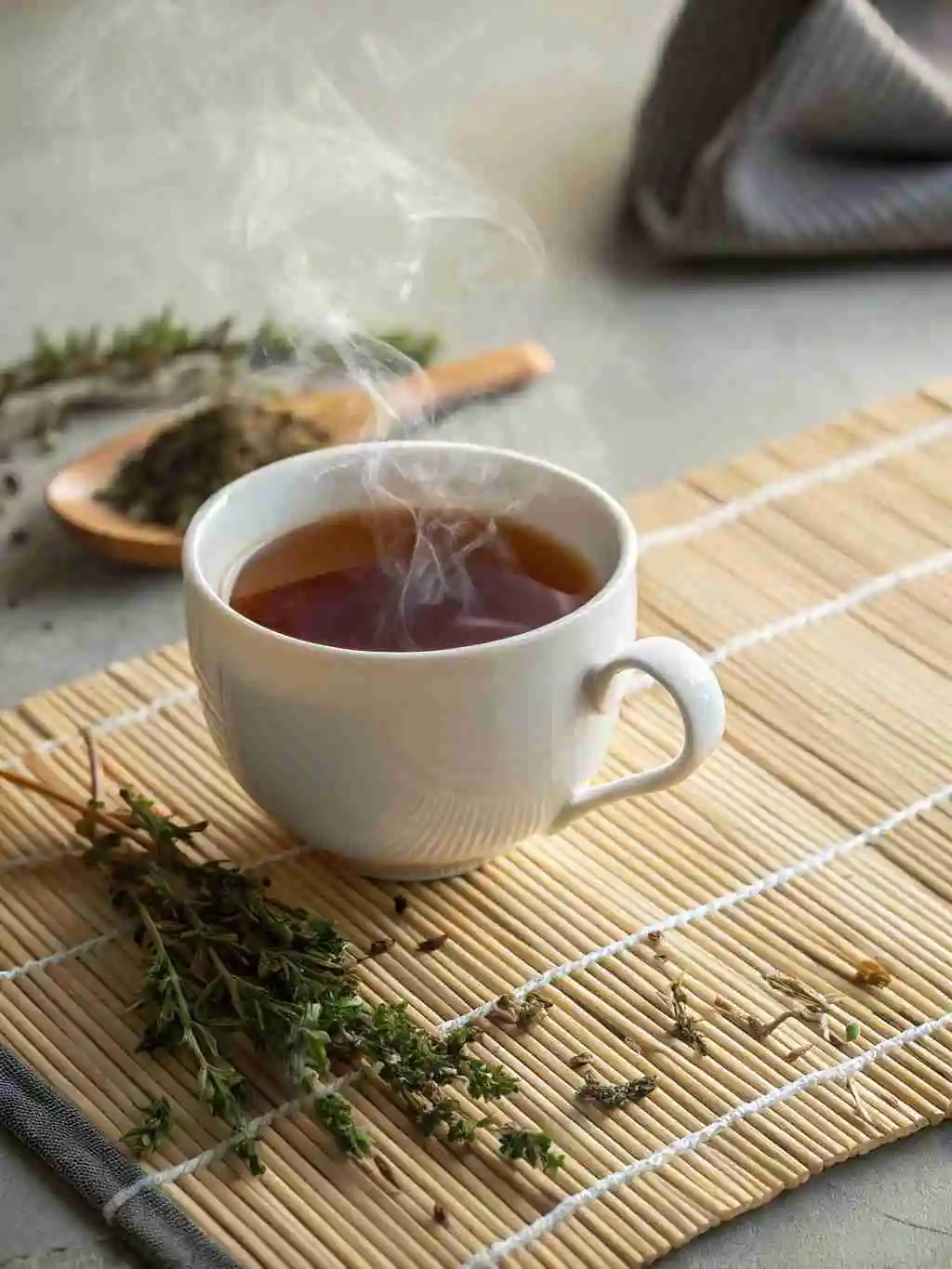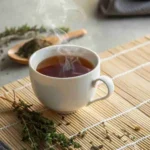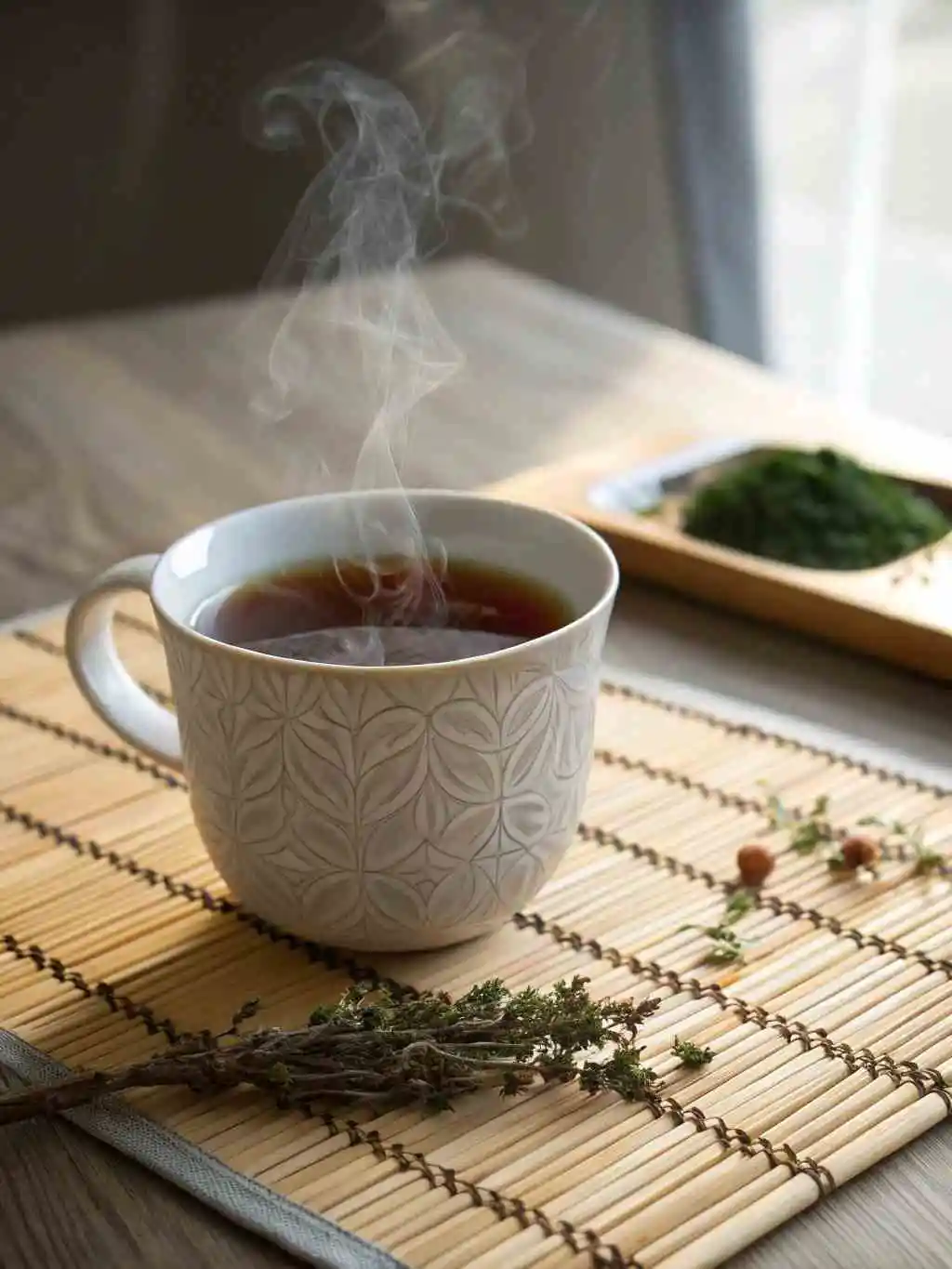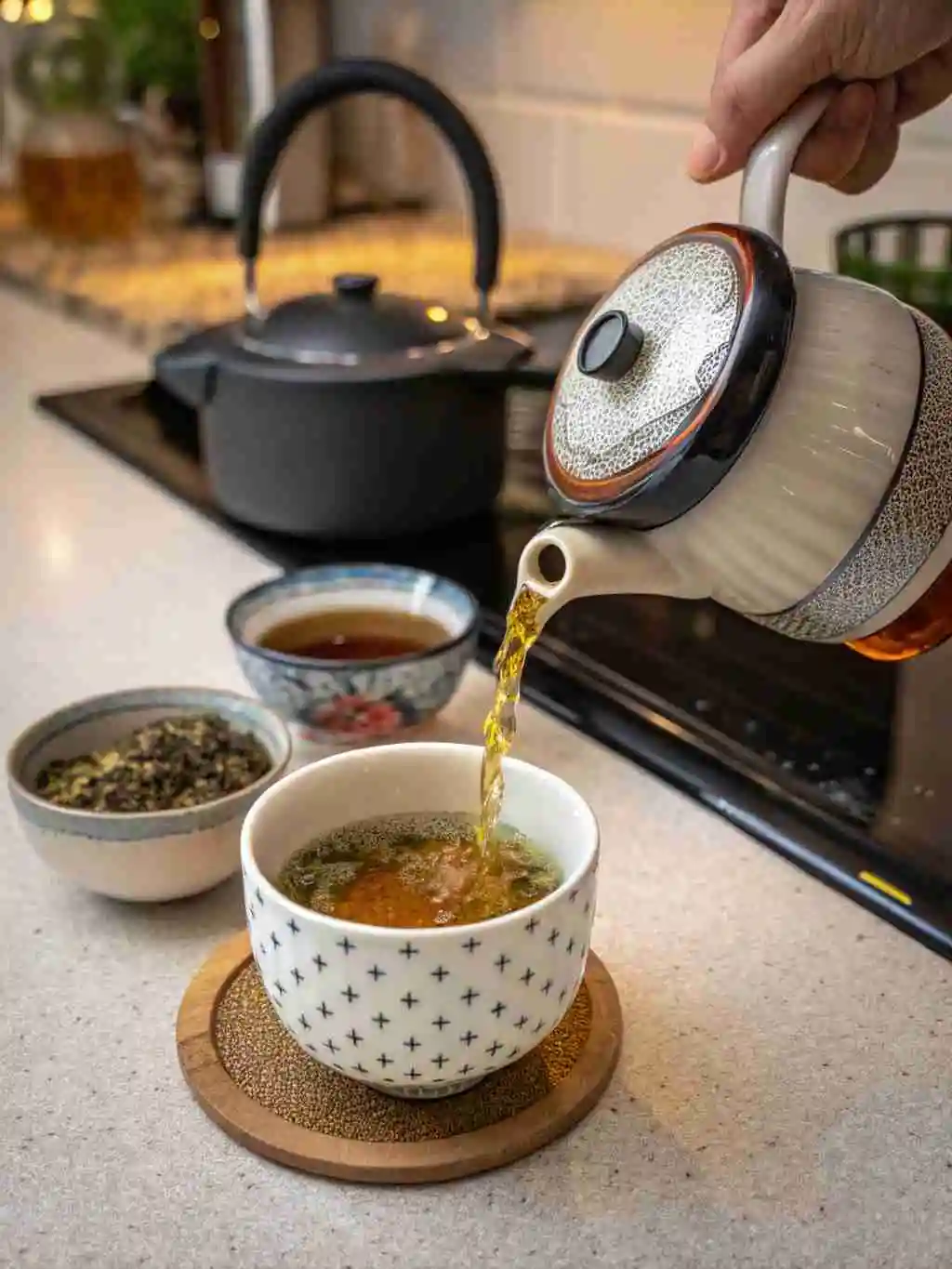Last updated on August 19th, 2025
Japanese Mounjaro Tea is quickly becoming a global wellness trend and for good reason. Rooted in centuries-old herbal practices from Japan, this natural drink is now being embraced as a powerful, plant-based alternative to pharmaceutical weight-loss options like Mounjaro injections.
Unlike synthetic drugs, Japanese Mounjaro Tea is brewed from a blend of metabolism-boosting herbs and natural ingredients traditionally used to control appetite, support digestion, and improve overall vitality. It offers a holistic approach to weight management without the side effects often linked to medications.

In this in-depth article, we’ll explore everything you need to know about this potent tea from its history and ingredients to how it compares to the Brazilian “Manjaro” and how to brew it at home. We’ll also highlight other popular Japanese teas for fat loss and natural alternatives to modern drugs.
Don’t miss our Japanese Mounjaro Detox Drink for more healthy drink options.
Table of Contents
Table of Contents
Introduction to Japanese Mounjaro Tea
What is Japanese Mounjaro Tea?
Japanese Mounjaro Tea is a natural herbal drink designed to support weight loss, reduce appetite, and improve metabolism without pharmaceuticals. Unlike the injectable drug Mounjaro, this tea uses time-tested Japanese herbs like bitter melon, fermented green tea, and knotweed, offering a gentler, holistic approach to wellness.
It mimics the effects of GLP-1 (a hormone that regulates hunger), making it a popular natural alternative to Mounjaro injections. Many people turn to it to aid digestion, boost energy, and support long-term fat loss.
Origins and Cultural Roots
Tea in Japan is more than a drink it’s a wellness tradition. Japanese Mounjaro Tea reflects this culture, blending herbs used for centuries by monks and healers for stamina, focus, and inner balance.
The tea’s roots lie in Okinawan practices and Zen philosophies, focusing on natural healing through daily rituals. Its ingredients are chosen not just for taste, but for their ability to support a leaner, healthier body naturally.
Print
Japanese Mounjaro Tea: The Natural Weight Loss Drink Backed by Tradition
- Total Time: 12 minutes
- Yield: 1 pot (2-3 servings)
Description
A centuries-old Japanese herbal tea blend that supports weight loss, improves metabolism, and offers a natural alternative to pharmaceutical solutions like Mounjaro injections.
Ingredients
- 1 tsp dried bitter melon (sliced or powdered)
- 1 tsp fermented green tea leaves (or pu-erh)
- ½ tsp dried Japanese knotweed root (optional)
- 1 small piece dried ginger
- 3 cups filtered water
Instructions
- Bring the water to a boil, then lower the heat to maintain a light simmer.
- Place all the herbs into the pot and let them gently simmer for 5 to 7 minutes.
- Strain and pour into a mug.
- Drink warm, 1–2 times daily ideally before meals.
- You can chill the tea and enjoy it cold. For a hint of sweetness, add lemon juice or raw honey.
Notes
Drink before meals to help control appetite. Avoid sugar or artificial sweeteners to preserve detox benefits.
- Prep Time: 5 minutes
- Cook Time: 7 minutes
- Category: Beverage
- Method: Stovetop
- Cuisine: Japanese
Nutritional Composition and Natural Ingredients
Key Herbs Used in Japanese Mounjaro Tea
The power behind Japanese Mounjaro Tea lies in its carefully selected herbs, known for their fat-burning and appetite-suppressing qualities. These ingredients work in harmony to support healthy weight loss without artificial stimulants or synthetic compounds.
Here are some of the standout ingredients:
| Herb | Primary Benefit | Role in Weight Loss |
|---|---|---|
| Bitter Melon (Goya) | Blood sugar regulation | Helps curb cravings and reduce fat storage |
| Fermented Green Tea (Pu-erh style) | High in catechins | Boosts metabolism and aids fat oxidation |
| Japanese Knotweed | Rich in resveratrol | Supports insulin sensitivity and inflammation control |
| Senna Leaves | Gentle detoxifier | Supports digestion and reduces bloating |
| Licorice Root | Hormonal balance | Supports adrenal function and reduces stress eating |
This blend of traditional and medicinal herbs makes Japanese Mounjaro Tea a potent, all-natural supplement for those looking to lose weight without harsh chemicals.
Nutritional Profile and Active Compounds
While not calorie-dense, Japanese Mounjaro Tea is packed with plant-based bioactives that stimulate the body’s natural fat-burning and detox pathways. The most important compounds include:
- Catechins: Found in fermented and green teas, they increase thermogenesis.
- Resveratrol: A powerful antioxidant that mimics calorie restriction and supports metabolism.
- Saponins: From bitter melon, help break down fat and regulate glucose.
- Flavonoids: Promote heart health while reducing inflammation linked to obesity.
Most importantly, the tea supports GLP-1 activity naturally, the same hormone targeted by injectable Mounjaro. By helping you feel fuller for longer, it aids portion control without forcing you into strict diets.
Many people pair this tea with light meals or morning walks to boost its effectiveness, making it an easy addition to a balanced, healthy routine.
Japanese Mounjaro Tea and Weight Loss
How the Tea Supports Metabolism and Fat Burning
Japanese Mounjaro Tea helps burn fat naturally by boosting metabolism and curbing appetite. Key herbs like bitter melon, fermented green tea, and knotweed work together to:
- Increase fat oxidation
- Balance blood sugar to reduce cravings
- Improve digestion and reduce bloating
- Support GLP-1 activity (helps you feel full)
Unlike stimulants or pills, this tea provides a gentle, steady effect making it ideal for long-term weight loss.
Studies and Real-Life Results
Although comprehensive studies on the full tea blend are scarce, individual ingredients have shown encouraging results in existing research:
- Bitter melon helps reduce belly fat
- Green tea catechins boost calorie burn
- Resveratrol supports metabolism
Many users say they experience increased energy, reduced bloating, and a greater sense of fullness throughout the day. Many say they noticed weight changes in just a few weeks of regular use.

Japanese vs. Brazilian Mounjaro Drinks
What’s the Difference Between Japanese and Brazilian Mounjaro?
Though they sound similar, Japanese Mounjaro Tea and Brazilian Manjaro drink are not the same. Both are promoted as natural weight-loss aids, but they differ significantly in origin, ingredients, and approach.
Japanese Mounjaro Tea draws its origins from time-honored practices in Japanese herbal medicine. It focuses on ingredients like fermented green tea, bitter melon, and knotweed plants known to boost metabolism and balance hormones naturally.
Brazilian Manjaro, on the other hand, is often a blend of tropical herbs like sene leaf, hibiscus, and guarana, designed to cleanse the body and increase energy. While it may have a stronger laxative effect, it doesn’t offer the same hormone-balancing or appetite-suppressing benefits as its Japanese counterpart.
| Feature | Japanese Mounjaro Tea | Brazilian Manjaro |
|---|---|---|
| Origin | Japan | Brazil |
| Key Herbs | Bitter melon, knotweed, fermented tea | Hibiscus, sene leaf, guarana |
| Focus | Metabolism + GLP-1 support | Detox + energy boost |
| Method | Slow, balanced weight loss | Rapid water loss/detox |
| Caffeine | Low | Often High |
So, while both teas can support weight goals, Japanese Mounjaro Tea is more sustainable and balanced for long-term wellness.
Cultural Approaches to Natural Wellness
Japanese wellness emphasizes consistency, balance, and natural healing. Their tea culture supports daily detox and long-term health not just quick fixes.
In contrast, many Brazilian drinks focus on cleansing and high energy for fast results. While effective for short-term use, they may not suit those seeking gentle, ongoing support.
If you prefer slow and steady fat loss rooted in tradition, Japanese Mounjaro Tea is the better choice.
Natural Alternatives to Mounjaro Injections
How Japanese Mounjaro Tea Compares to Mounjaro Medication
Mounjaro injections support weight loss by imitating GLP-1, a natural hormone that regulates appetite and blood sugar levels. But injections aren’t for everyone. Japanese Mounjaro Tea offers a gentler, plant-based option that supports similar benefits naturally.
Its herbs, like bitter melon and fermented green tea, help curb appetite, balance blood sugar, and boost fat metabolism without needles or prescriptions.
Natural GLP-1 Boosters Found in Herbs
Here are a few powerful ingredients found in natural teas and remedies that act like GLP-1:
| Ingredient | Key Benefit |
|---|---|
| Bitter Melon | Reduces hunger & supports blood sugar |
| Green Tea | Boosts metabolism, burns fat |
| Cinnamon | Helps control blood sugar |
| Fenugreek | Promotes fullness, reduces cravings |
Japanese Mounjaro Tea combines several of these herbs, making it a smart choice for those seeking a safe, natural weight-loss aid.
Traditional Japanese Teas for Weight Loss
Japan’s Best Fat-Burning Teas
In addition to Japanese Mounjaro Tea, several traditional Japanese teas help with natural weight loss:
| Tea | Benefit |
|---|---|
| Matcha | Speeds up metabolism with EGCG |
| Oolong | Supports digestion and fat burn |
| Sencha | Boosts calorie burn and energy |
| Mugicha | Caffeine-free and curbs appetite |
These teas are easy to enjoy daily and make great companions to Japanese Mounjaro Tea.
Healthy Tea Habits in Japan
In Japan, tea is part of everyday life. People sip different teas throughout the day to stay focused, support digestion, and manage weight naturally.
Adding Japanese Mounjaro Tea to these habits can enhance fat loss without extreme diets.
How to Make Japanese Mounjaro Tea at Home

Step-by-Step Brewing Guide
Making Japanese Mounjaro Tea at home is simple—and far more affordable than buying pre-packaged blends. All you need are a few core ingredients and basic kitchen tools.
Ingredients (for 1 pot)
- 1 tsp dried bitter melon (sliced or powdered)
- 1 tsp fermented green tea leaves (or pu-erh)
- ½ tsp dried Japanese knotweed root (optional)
- 1 small piece dried ginger (for flavor and digestion)
- 3 cups filtered water
Instructions
- Bring the water to a boil, then lower the heat to maintain a light simmer.
- Place all the herbs into the pot and let them gently simmer for 5 to 7 minutes.
- Strain and pour into a mug.
- Drink warm, 1–2 times daily ideally before meals.
You can also chill the tea and enjoy it cold. For a hint of sweetness, consider adding a splash of lemon juice or a drizzle of raw honey.
Tips to Boost Effectiveness
- Drink before meals to help control appetite.
- Combine with a light snack or herbal mocktail for balance.
- Avoid sugar or artificial sweeteners they reduce the detox benefits.
Making Japanese Mounjaro Tea yourself lets you control the quality, freshness, and ingredient strength perfect for a consistent, healthy routine.
Real User Testimonials and Safety Information
What Real Users Say About Japanese Mounjaro Tea
Many people who’ve added Japanese Mounjaro Tea to their daily routine report positive results—especially when combined with healthy eating and movement. While individual outcomes vary, here are some common experiences:
| User Feedback | Experience |
|---|---|
| “It helps me feel full longer.” | Appetite control |
| “No jitters like with caffeine pills.” | Gentle energy boost |
| “Lost 6 pounds in a month just drinking it twice a day.” | Gradual fat loss |
| “My digestion feels more regular.” | Reduced bloating |
Most users enjoy the natural taste, the steady results, and the fact that it fits easily into everyday life without a major lifestyle change.
Is Japanese Mounjaro Tea Safe?
Generally, Japanese Mounjaro Tea is considered safe for most adults when consumed in moderation. But like any herbal blend, it’s important to be aware of the following:
- Avoid if pregnant or nursing, unless approved by a doctor
- People with diabetes or on blood sugar meds should consult a physician
- Start with one cup daily to test for sensitivity
- Don’t overconsume stick to 1–2 servings per day
There are no known serious side effects when prepared properly. However, mild symptoms like nausea or loose stools can occur if the body isn’t used to detox herbs.
If you’re unsure, speak with a healthcare provider before making the tea a daily habit.
Where to Buy Authentic Japanese Mounjaro Tea
Buying Guide: What to Look for
If you’re ready to try Japanese Mounjaro Tea, be cautious many products online use the name but lack authentic ingredients. Here’s how to spot a genuine, high-quality tea:
Look for:
- A short ingredient list with bitter melon, fermented green tea, or Japanese knotweed
- Labels that say organic, non-GMO, or no additives
- Clear origin labeling (Japan preferred or reputable herbal sources)
Avoid blends that contain laxatives, added sugars, or synthetic fat burners. These can cause side effects and don’t reflect the natural benefits of traditional Japanese herbal tea.
Online vs. In-Store Shopping
You can find Japanese Mounjaro Tea in:
| Source | Pros | Cons |
|---|---|---|
| Online retailers (Amazon, Etsy, tea boutiques) | Wide selection, reviews, convenience | Risk of fake blends—read labels carefully |
| Asian grocery stores | More authentic options, often cheaper | Limited stock, few brand choices |
| Natural health stores | Usually organic or herbal-certified | Pricier, not always labeled as “Mounjaro” |
Expert tip: To find the best options, try searching for terms like “bitter melon cleanse tea,” “Japanese fermented slimming tea,” or “herbal GLP-1 support tea.”
Find new baking ideas and smart marketing strategies by exploring content on Pinterest.
Conclusion
Japanese Mounjaro Tea offers a refreshing, natural path to weight loss without prescriptions, harsh chemicals, or extreme diets. Rooted in traditional Japanese herbal medicine, this tea blends metabolism-boosting, appetite-suppressing, and blood sugar-balancing herbs like bitter melon and fermented green tea into one powerful daily drink.
Whether you’re seeking a natural alternative to Mounjaro injections, exploring the world of Japanese wellness, or simply adding a clean, plant-based option to your routine, this tea delivers steady, sustainable results.
For best results, pair Japanese Mounjaro Tea with light meals, mindful hydration, and simple movement. It’s not a quick fix but a long-term ally in your health journey
Frequently Asked Questions About Japanese Mounjaro Tea
What is Japanese Mounjaro drink?
Japanese Mounjaro Tea is a natural herbal tea inspired by traditional Japanese ingredients like bitter melon, fermented green tea, and Japanese knotweed. It’s designed to support weight loss by boosting metabolism, reducing appetite, and balancing blood sugar offering a plant-based alternative to Mounjaro injections.
What tea do Japanese drink for weight loss?
Japanese people commonly drink matcha, oolong, sencha, and mugicha (barley tea) for weight loss and overall health. These teas help burn fat, improve digestion, and curb appetite. Japanese Mounjaro Tea is a newer herbal blend built on similar principles but includes stronger detox and GLP-1-mimicking ingredients.
Is there a natural equivalent to Mounjaro?
Yes. While not a direct replacement, Japanese Mounjaro Tea and herbs like bitter melon, berberine, and green tea catechins naturally support the same processes as GLP-1-based medications like Mounjaro. They help reduce hunger, stabilize blood sugar, and promote fat burning.
What is the Brazilian Manjaro?
Brazilian Manjaro is another herbal weight-loss tea, but it differs from the Japanese version. It often includes sene leaf, hibiscus, and guarana and focuses more on cleansing and energy boosts, often with stronger laxative effects. Japanese Mounjaro Tea offers a more balanced, long-term approach to natural weight loss.
What is the natural Mounjaro drink?
A natural Mounjaro drink refers to teas or herbal blends that mimic the effects of Mounjaro injections (appetite control, blood sugar balance). Japanese Mounjaro Tea is one of the most popular, combining several GLP-1-supportive herbs in a simple daily tea.
